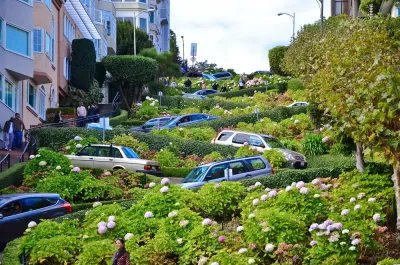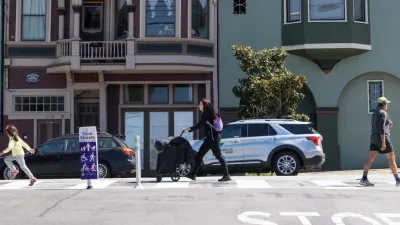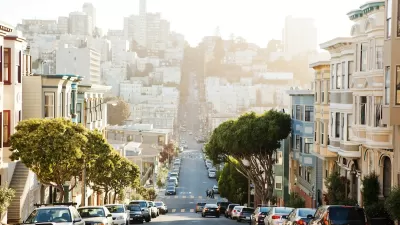San Francisco is looking for ways to manage—and protect—the masses of tourists who want to walk "the World's Crookedest Street."

In the residential Russian Hill neighborhood of San Francisco, one block draws an estimated 2 million pedestrians a year—the famously steep, winding stretch of Lombard Street.
In response to complaints from residents about traffic, noise, litter, and petty crime, the County Transportation Authority is studying ways to manage the crowds, SF Gate reports. After a year researching how other tourist destinations handle similar problems, the study is now exploring solutions—including barring cars and turning the area into a pedestrian-only plaza.
Other proposals include hiring a mass of parking and safety officers, requiring reservations, and charging a toll. Some tourists told the paper they would be willing to pay an admission fee, while at least one said pedestrians should visit for free and separately from cars.
FULL STORY: Turn for the worse on SF’s famous Lombard Street

Study: Maui’s Plan to Convert Vacation Rentals to Long-Term Housing Could Cause Nearly $1 Billion Economic Loss
The plan would reduce visitor accommodation by 25,% resulting in 1,900 jobs lost.

Alabama: Trump Terminates Settlements for Black Communities Harmed By Raw Sewage
Trump deemed the landmark civil rights agreement “illegal DEI and environmental justice policy.”

North Texas Transit Leaders Tout Benefits of TOD for Growing Region
At a summit focused on transit-oriented development, policymakers discussed how North Texas’ expanded light rail system can serve as a tool for economic growth.

Paris Bike Boom Leads to Steep Drop in Air Pollution
The French city’s air quality has improved dramatically in the past 20 years, coinciding with a growth in cycling.

Why Housing Costs More to Build in California Than in Texas
Hard costs like labor and materials combined with ‘soft’ costs such as permitting make building in the San Francisco Bay Area almost three times as costly as in Texas cities.

San Diego County Sees a Rise in Urban Coyotes
San Diego County experiences a rise in urban coyotes, as sightings become prevalent throughout its urban neighbourhoods and surrounding areas.
Urban Design for Planners 1: Software Tools
This six-course series explores essential urban design concepts using open source software and equips planners with the tools they need to participate fully in the urban design process.
Planning for Universal Design
Learn the tools for implementing Universal Design in planning regulations.
Smith Gee Studio
Alamo Area Metropolitan Planning Organization
City of Santa Clarita
Institute for Housing and Urban Development Studies (IHS)
City of Grandview
Harvard GSD Executive Education
Toledo-Lucas County Plan Commissions
Salt Lake City
NYU Wagner Graduate School of Public Service





























